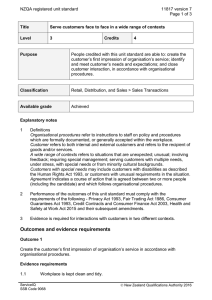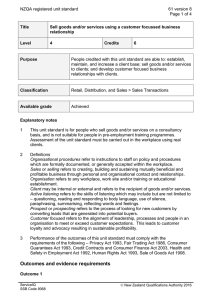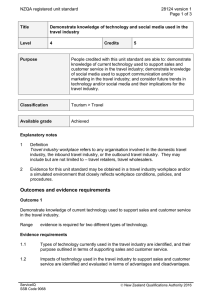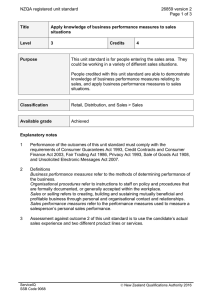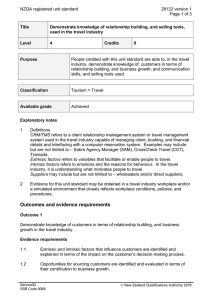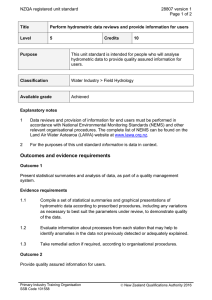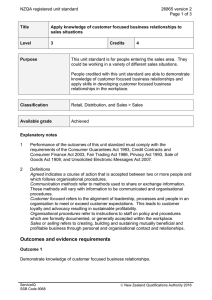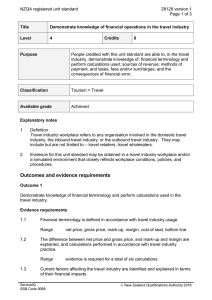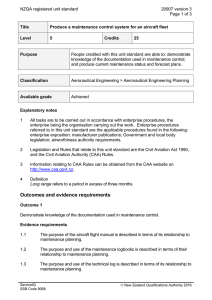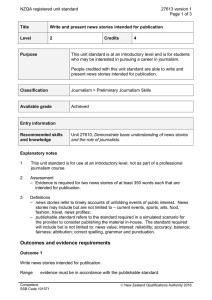NZQA registered unit standard 12009 version 4 Page 1 of 3
advertisement
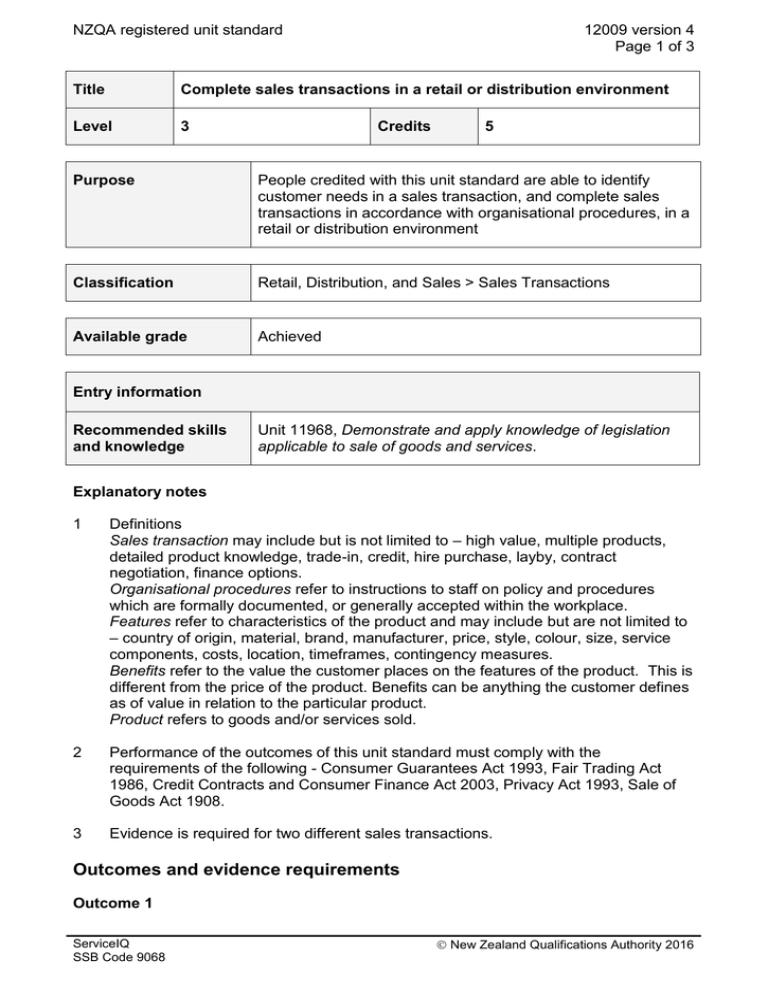
NZQA registered unit standard 12009 version 4 Page 1 of 3 Title Complete sales transactions in a retail or distribution environment Level 3 Credits 5 Purpose People credited with this unit standard are able to identify customer needs in a sales transaction, and complete sales transactions in accordance with organisational procedures, in a retail or distribution environment Classification Retail, Distribution, and Sales > Sales Transactions Available grade Achieved Entry information Recommended skills and knowledge Unit 11968, Demonstrate and apply knowledge of legislation applicable to sale of goods and services. Explanatory notes 1 Definitions Sales transaction may include but is not limited to – high value, multiple products, detailed product knowledge, trade-in, credit, hire purchase, layby, contract negotiation, finance options. Organisational procedures refer to instructions to staff on policy and procedures which are formally documented, or generally accepted within the workplace. Features refer to characteristics of the product and may include but are not limited to – country of origin, material, brand, manufacturer, price, style, colour, size, service components, costs, location, timeframes, contingency measures. Benefits refer to the value the customer places on the features of the product. This is different from the price of the product. Benefits can be anything the customer defines as of value in relation to the particular product. Product refers to goods and/or services sold. 2 Performance of the outcomes of this unit standard must comply with the requirements of the following - Consumer Guarantees Act 1993, Fair Trading Act 1986, Credit Contracts and Consumer Finance Act 2003, Privacy Act 1993, Sale of Goods Act 1908. 3 Evidence is required for two different sales transactions. Outcomes and evidence requirements Outcome 1 ServiceIQ SSB Code 9068 New Zealand Qualifications Authority 2016 NZQA registered unit standard 12009 version 4 Page 2 of 3 Meet customer needs in a sales transaction. Evidence requirements 1.1 Components of customer motivation is identified accurately. Range components may include but are not limited to – personal, social, rational, emotional. 1.2 Interaction with customer is appropriate to customer motivation. 1.3 Customer requirements are established accurately and agreed. Range 1.4 may include but are not limited to – open questions, closed questions, suggestion, providing options, demonstration, customer involvement, opinion, testimony, story, application to specific situations. Communication techniques for dealing with the sales transaction are applied. Range techniques may include but are not limited to – persuasion, flexibility, analysis, synthesis, time management, resource management, language, manner, turning features into benefits, responding to objections, negotiation, knowledge of legislation, gaining agreement, showing or describing features and benefits, identifying future needs, identifying added value, upselling, closing; evidence for three techniques across the two transactions. Outcome 2 Complete sales transactions in accordance with organisational procedures. Evidence requirements 2.1 Information provided to customer about products is accurate and appropriate to the level of detail required by customers. 2.2 Any disclosure of conditions of sale is accurate and agreed with customers. Range Planned review date ServiceIQ SSB Code 9068 may include but not limited to – tradeins, warranties, insurance, finance options, layby, hire purchase, after sales service, payment options. 31 December 2019 New Zealand Qualifications Authority 2016 NZQA registered unit standard 12009 version 4 Page 3 of 3 Status information and last date for assessment for superseded versions Process Version Date Last Date for Assessment Registration 1 31 October 1997 31 December 2013 Review 2 28 February 2006 31 December 2013 Review 3 15 April 2011 31 December 2016 Review 4 21 May 2015 N/A Consent and Moderation Requirements (CMR) reference 0225 This CMR can be accessed at http://www.nzqa.govt.nz/framework/search/index.do. Please note Providers must be granted consent to assess against standards (accredited) by NZQA, before they can report credits from assessment against unit standards or deliver courses of study leading to that assessment. Industry Training Organisations must be granted consent to assess against standards by NZQA before they can register credits from assessment against unit standards. Providers and Industry Training Organisations, which have been granted consent and which are assessing against unit standards must engage with the moderation system that applies to those standards. Requirements for consent to assess and an outline of the moderation system that applies to this standard are outlined in the Consent and Moderation Requirements (CMRs). The CMR also includes useful information about special requirements for organisations wishing to develop education and training programmes, such as minimum qualifications for tutors and assessors, and special resource requirements. Comments on this unit standard Please contact ServiceIQ qualifications@ServiceIQ.org.nz if you wish to suggest changes to the content of this unit standard. ServiceIQ SSB Code 9068 New Zealand Qualifications Authority 2016
